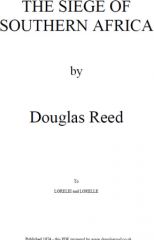
Author : Reed Douglas
Title : The Siege Of Southern Africa
Year : 1974
Link download : Reed_Douglas_-_The_Siege_Of_Southern_Africa.zip
Foreword. In the first book which I wrote after my arrival in South Africa in 19471 I said, “I expect Africa to become of major importance during the next fifty years ... for third parties, international aspirants to world power who sought to raise the dark man against the white one, and to divide the white men among themselves, South Africa was a land of opportunity.” In 1948-9, when this was written, it was a very long shot even for a man of my experience.2 In 1948-9 Africa was a minuscule dot on the outer periphery of the radar screen of international affairs and events. It was not present in the mind of the public masses at all. Africa was for them a large place far away which they knew nothing about (as Mr. Neville Chamberlain might have said). That was to be radically changed in the 1960's when, by obvious preconcerting at the super-national or behind the scenes level, a propaganda campaign equivalent in its noise and intensity to a barrage on the Somme in 1916 or a thousand-bomber raid on Hamburg in 1944 was suddenly opened against the remnant of White-ruled Africa because it did not lie down and let the tidal wave of massacre, one-man-dictatorship and terrorist police sweep over it from the north, where one newly “emergent” state after another demonstrated the abiding validity of old Tippu Tib's dictum that “the man with the gun will always rule Africa”. I also discovered in those far-off days of the Forties, when the word “Africa” was not present at all in the mind of the masses at large (today it preponderates in the screaming daily headlines and violent opinions about it are loud on the lips of every initiated conspirator or imbecilic infatuate in the world), very large plans for Africa were already shaped in those secret places “behind the scenes whence the world is truly governed” (Disraeli). Thus a Mr. Truman from Missouri, having ascended the Democratic elevator from the Vice- Presidential to the Presidential floor at the close of Mr. Roosevelt's catastrophic fourteen years, was soon prompted to announce a programme for “saving the world from Communism” which contained a “Fourth Point”, “a defence master plan to open up Africa South of the Sahara”. This envisaged a “huge project” for building roads and railways between the African possessions of Britain and those of other countries, and establishing “new airways and modernizing scores of new ports”. (Long before any of these blessings could accrue, Britain had been bereft of all “possessions in Africa”.) Intrigued by the discovery of this stupendous scheme for developing Africa, I pursued my researches and found that a similarly stupendous scheme had already been outlined in a book by the then American Communist leader, Mr. Earl Browder. Mr. Browder's vision (or his masters'; Communist leaders in countries outside the Soviet area do not have such ideas of their own) was that America should underwrite “a gigantic programme for the industrialization of Africa ... largescale plans for railroad and highway building ... all-round modernization ... in undeveloped areas”. Fine and fair words, but all that came of them in the next twenty years was bloodshed, of Black men by Black men, on a scale probably greater than that of the Second World War. They revealed, however, the continued collusion of American and Communist strategy “behind the scenes”, the earliest public sign of which was given by the words of the first of the puppet Presidents, Woodrow Wilson, to Congress in 1917 on the occasion of the Bolshevist Revolution: “Does not every American feel that assurance has been added to our hope for the future peace of the world by the wonderful and heartening things that have happened in the last ten weeks in Russia ... here is a fit partner for a league of honour”. A straight line runs from this early revelation through the fourteen Roosevelt years. President Roosevelt told a penitent Communist defector to “go jump in the lake” when informed with proof that his right hand “adviser” was a Soviet agent: the same who was the dying President's right hand adviser at Yalta when the decision was taken to transfer half of Europe from the Hitlerist to the Stalinist curse, and to drive out the Allies' Chinese allies from China and establish the Communists in their place. These are all matters of authentic and verifiable record. Some day a competent dramatist might take the Yalta Conference for his theme. The scene showing Stalin gazing sardonically at the dying President opposite him, surrounded by men whom Stalin well knew to be his (Stalin's) own men has all the stuff of high drama. This shadow policy of parallelism with Communism in deeds while publicly professing inflexible antagonism to Communism continued through the presidencies of Truman and Eisenhower. Under President Nixon there was a recoil from it. As far as Africa is concerned, at any rate, President Nixon took off the heat. He did not send “Special Emissaries for Africa”, like the egregious Mr. Mennen “Soapy” Williams, to go round Africa calling for the South African Government to be “brought to its knees”. Neither did he send members of his family to harangue students of South African universities about the evils of South Africa. President Nixon, indeed, showed a sense of responsibility in world affairs: and because of that the termites in his administration, and those in other countries who also work “behind the scenes” under the cover-name of “liberalism”, will break him if they can. The reader will be able to judge of that for himself by 1976. If this president can survive the international onslaught against him and can halt his country in doing the Communist revolution's work for it, which is what his predecessors did, the outlook for Africa, and for much else, would greatly improve. If the next President is of the Wilson-Roosevelt school, the world can, in my opinion, say goodbye to the United States it has known, and should watch out for its own survival. And now, to Southern Africa and its beleaguerment. Douglas Reed South Africa, South West Africa, Angola, Rhodesia, Lesotho, Mozambique, Swaziland, Botswana, 1973-4. ...

Demolins Edmond - Saint Louis
Auteur : Demolins Edmond Ouvrage : Saint Louis Année : 19881 Lien de téléchargement :...














